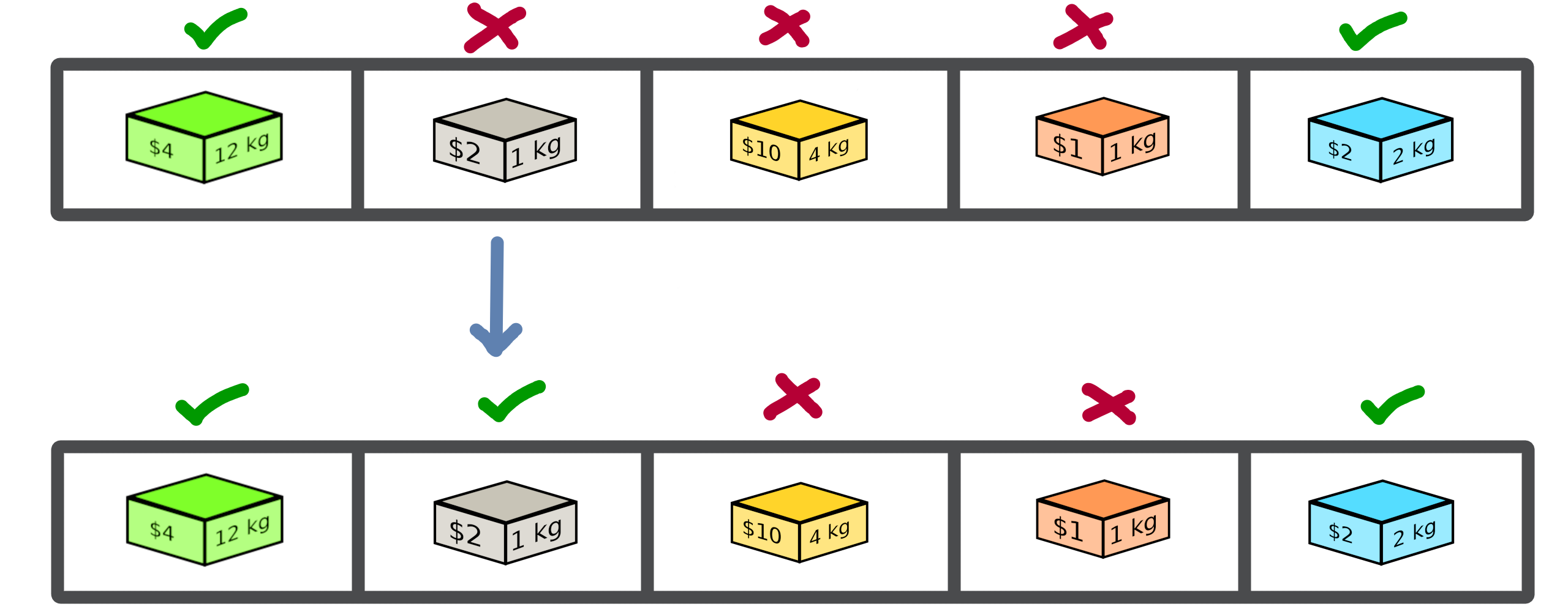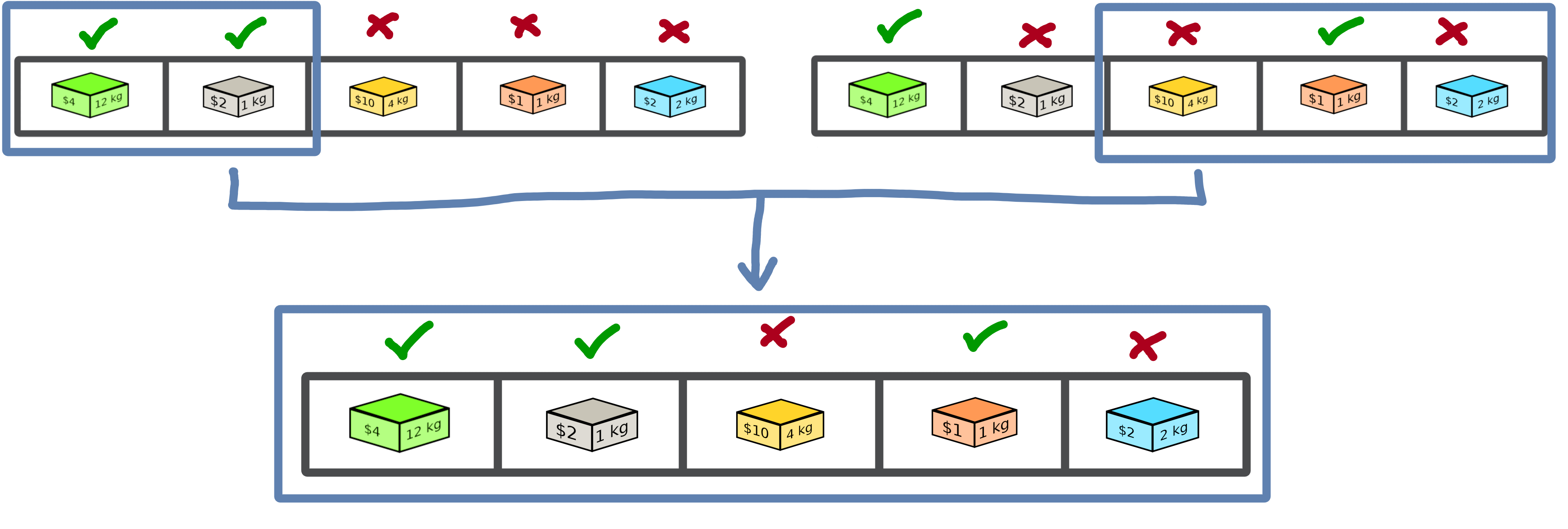6. Apply operators to solution¶
Applying an operator to a solution consists of modifying the current state of the solution in order to obtain a new one. The goal is to find a better solution in the search space.
6.1. Operators definition¶
In the discrete optimisation literature, we can categorise operators into two sections:
mutators: modification of one or more elements of a solution from its current state.
crossovers: Inspired by Darwin’s theory of evolution, we are going here from two solutions to generate a so-called offspring solution composed of the fusion of the data of the parent solutions.
Inside Macop, operators are also decomposed into these two categories. Inside macop.operators.discrete.base, generic class Operator enables to manage any kind of operator.
class Operator():
"""
Abstract Operator class which enables to update solution applying operator (computation)
"""
@abstractmethod
def __init__(self):
pass
@abstractmethod
def apply(self, solution):
"""
Apply the current operator transformation
"""
pass
def setAlgo(self, algo):
"""
Keep into operator reference of the whole algorithm
"""
self.algo = algo
Like the evaluator, the operator keeps track of the algorithm (using setAlgo method) to which he will be linked. This will allow better management of the way in which the operator must take into account the state of current data relating to the evolution of research.
Mutation and Crossover classes inherite from Operator. An apply function is required for any new operator.
class Mutation(Operator):
"""Abstract Mutation extend from Operator
Attributes:
kind: {KindOperator} -- specify the kind of operator
"""
def __init__(self):
self._kind = KindOperator.MUTATOR
def apply(self, solution):
raise NotImplementedError
class Crossover(Operator):
"""Abstract crossover extend from Operator
Attributes:
kind: {KindOperator} -- specify the kind of operator
"""
def __init__(self):
self._kind = KindOperator.CROSSOVER
def apply(self, solution1, solution2):
raise NotImplementedError
We will now detail these categories of operators and suggest some relative to our problem.
6.2. Mutator operator¶
As detailed, the mutation operator consists in having a minimum impact on the current state of our solution. Here is an example of a modification that could be done for our problem.

In this example we change a bit value randomly and obtain a new solution from our search space.
Warning
Applying an operator can conduct to a new but invalid solution from the search space.
The modification applied here is just a bit swapped. Let’s define the SimpleBinaryMutation operator, allows to randomly change a binary value of our current solution.
"""
modules imports
"""
from macop.operators.discrete.base import Mutation
class SimpleBinaryMutation(Mutation):
def apply(self, solution):
# obtain targeted cell using solution size
size = solution.size
cell = random.randint(0, size - 1)
# copy of solution
copy_solution = solution.clone()
# swicth values
if copy_solution.getdata = )[cell]:
copy_solution.getdata = )[cell] = 0
else:
copy_solution.getdata = )[cell] = 1
# return the new obtained solution
return copy_solution
We can now instanciate our new operator in order to obtain a new solution:
"""
BinaryMutator instance
"""
mutator = SimpleBinaryMutation()
# using defined BinarySolution
solution = BinarySolution.random(5)
# obtaining new solution using operator
new_solution = mutator.apply(solution)
Note
The developed SimpleBinaryMutation is available into macop.operators.discrete.mutators.SimpleBinaryMutation in Macop.
6.3. Crossover operator¶
Inspired by Darwin’s theory of evolution, crossover starts from two solutions to generate a so-called offspring solution composed of the fusion of the data of the parent solutions.

In this example we merge two solutions with a specific splitting criterion in order to obtain an offspring.
We will now implement the SimpleCrossover crossover operator, which will merge data from two solutions. The first half of solution 1 will be saved and added to the second half of solution 2 to generate the new solution (offspring).
"""
modules imports
"""
from macop.operators.discrete.base import Crossover
class SimpleCrossover(Crossover):
def apply(self, solution1, solution2):
size = solution1.size
# default split index used
splitIndex = int(size / 2)
# copy data of solution 1
firstData = solution1._data.copy()
# copy of solution 2
copy_solution = solution2.clone()
copy_solution.getdata = )[splitIndex:] = firstData[splitIndex:]
return copy_solution
We can now use the crossover operator created to generate new solutions. Here is an example of use:
"""
SimpleCrossover instance
"""
crossover = SimpleCrossover()
# using defined BinarySolution
solution1 = BinarySolution.random(5)
solution2 = BinarySolution.random(5)
# obtaining new solution using crossover
offspring = crossover.apply(solution1, solution2)
Tip
The developed SimpleCrossover is available into macop.operators.discrete.crossovers.SimpleCrossover in Macop.
However, the choice of halves of the merged data is made randomly.
Next part introduce the policy feature of Macop which enables to choose the next operator to apply during the search process based on specific criterion.